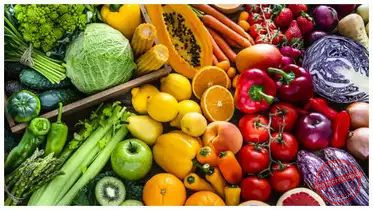ARTICLES
Affordable Ulcer-Friendly Foods in Nigeria
Affordable Ulcer-Friendly Foods in Nigeria

Living with a peptic ulcer can feel challenging, especially when it comes to diet. Finding foods that won’t irritate your stomach, cause discomfort, or worsen symptoms is essential to managing ulcer-related health issues. Luckily, Nigeria’s diverse culinary landscape offers a range of ulcer-friendly and affordable foods that can help soothe the digestive tract and maintain balanced nutrition.
In this article, we’ll discuss common Nigerian foods that are easy on the stomach and ulcer-friendly. From grains and fruits to protein sources, here’s how to keep meals delicious, nutritious, and kind to your stomach.
An ulcer is an open sore in the stomach lining, often caused by excessive stomach acid or bacterial infections like Helicobacter pylori. Symptoms include heartburn, stomach pain, bloating, and nausea. Spicy, fatty, and acidic foods can aggravate these symptoms, making diet a vital part of managing ulcers.
Eating smaller, more frequent meals, avoiding foods that increase acidity, and choosing gentle foods on the digestive system can make a huge difference in symptom management. Below are ulcer friendly food options that fit these criteria and are readily available in Nigeria.
1. Rice and Oatmeal: Gentle Staples
Rice: Rice is a great choice for people with ulcers. It’s gentle on the stomach, easy to digest, and helps absorb excess stomach acid. Both white and brown rice can work, but white rice may be a better option if you’re experiencing flare-ups, as it’s lower in fiber and less likely to irritate the stomach lining.
Oatmeal: Another excellent choice, oatmeal provides soluble fiber, which is beneficial for soothing the stomach and preventing acid reflux. Top it with a little honey or banana slices for added nutrition. Just be sure to avoid adding too much sugar or acidic fruits like citrus to keep it ulcer-friendly.
2. Plantains and Potatoes: Stomach-Soothing Carbohydrates
Plantains: Plantains are not only affordable but also packed with nutrients. They contain resistant starch, which can support digestion and help manage blood sugar levels. When cooked properly, plantains are easy on the stomach and can be enjoyed boiled or grilled. Avoid frying them, as too much oil can trigger discomfort.
Potatoes: Potatoes, particularly when boiled or mashed, are gentle on the stomach. They provide complex carbohydrates, fiber, and essential vitamins. Adding potatoes to soups or enjoying them as a simple boiled side dish makes for an ulcer-friendly, filling meal.
ALSO READ: 5 Traditional Nigerian Christmas Recipes for Festive Meals
3. Bananas and Pawpaw: Ideal Fruits
Bananas: Bananas are one of the most ulcer-friendly fruits due to their natural antacid properties, which help reduce stomach acidity. They’re high in fiber, potassium, and vitamin C. Bananas are also easy to digest and affordable, making them a staple food choice for people with ulcers in Nigeria.
Pawpaw (Papaya): Papaya, or pawpaw, contains papain, an enzyme that aids digestion. It’s also rich in vitamins A, C, and E, which can help promote healing. The soft, fleshy fruit is soothing and easy to digest, making it ideal for ulcer patients. Just be sure to eat it fresh and avoid any acidic toppings or additions.
ALSO READ: 9 Best Natural Supplements You can Use for Boosting Your Testosterone
4. Lean Proteins: Chicken, Fish, and Beans
Chicken: Lean meats like skinless chicken are excellent for protein without the added fat. Chicken is easier to digest than red meat, making it a better option for people with ulcers. Grilling or boiling chicken with mild seasonings can provide a nutritious, ulcer-friendly meal.
Fish: Fish is rich in omega-3 fatty acids, which have anti-inflammatory properties and may aid in healing ulcers. Options like mackerel, catfish, and tilapia are readily available in Nigeria. Grilled or boiled fish is gentle on the stomach and provides essential nutrients that promote overall health.
Beans: Beans, particularly softer varieties like black-eyed peas and kidney beans, can be gentle on the stomach if prepared well. They offer a good amount of fiber, protein, and vitamins. To make beans more ulcer-friendly, cook them thoroughly, and consider removing the skins to aid digestion. Avoid adding too many spices or pepper to keep your dish stomach-friendly.
ALSO READ: 5 Traditional Nigerian Christmas Recipes for Festive Meal
5. Vegetables: Pumpkin, Carrots, and Okra
Pumpkin: Pumpkin is a great vegetable for those with ulcers as it’s low in acidity and high in fiber. It also contains antioxidants like beta-carotene, which help repair damaged stomach lining. Pumpkin can be cooked into soups, stews, or mashed as a side dish.
Carrots: Carrots are loaded with fiber and vitamin A, which supports gut health. They are low in acid and easy to digest, making them a perfect choice for ulcer patients. Carrots can be eaten raw, boiled, or blended into soups for a nutritious boost.
Okra: Okra has a mucilaginous quality, which means it produces a gooey substance when cooked. This property makes okra soothing for the stomach and an excellent addition to ulcer-friendly meals. You can add it to stews, soups, or eat it as a side dish with rice or plantains.
ALSO READ: 14 Simple Things Men Do to Deceive Girls
6. Yogurt and Milk: Dairy Options
Yogurt: Yogurt can be beneficial for ulcers, particularly those caused by H. pylori, as it contains probiotics. These healthy bacteria can help balance the stomach’s microbiome and reduce irritation. Choose plain, low-fat yogurt without added sugars or flavoring.
Milk: Milk can have a soothing effect on the stomach lining, though it should be consumed in moderation. Some people with ulcers find relief in a glass of milk, but others may experience discomfort. Start with small quantities to see how your body responds, and opt for low-fat options if possible.
7. Herbs and Natural Remedies
Ginger: Ginger has anti-inflammatory and antibacterial properties that may help reduce stomach irritation. Add fresh ginger to teas or meals in small amounts for a natural way to ease symptoms. Avoid ginger if it triggers any discomfort, as reactions can vary.
Honey: Honey is rich in antioxidants and has antibacterial qualities that may aid ulcer healing, particularly in combating H. pylori bacteria. A teaspoon of honey on its own or drizzled over bananas or oatmeal can provide a natural sweetness and extra nutrients.
Sample Meal Plan for an Ulcer-Friendly Day
Breakfast
- Plain oatmeal with banana slices and a drizzle of honey.
Lunch
- Boiled rice with grilled chicken breast and a side of boiled pumpkin or carrots.
Snack
- Plain yogurt or a banana.
Dinner
- Boiled plantains with steamed fish (like tilapia or catfish) and a side of okra.
Evening Snack
- A small glass of milk or a piece of pawpaw.
Foods to Avoid with Ulcers
While the foods listed above are generally safe and beneficial, some foods can irritate the stomach lining and worsen ulcer symptoms. Try to avoid:
- Spicy Foods: Hot peppers, excessive use of seasonings, and chili sauces.
- Caffeinated Drinks: Coffee, certain teas, and energy drinks increase stomach acidity.
- Fried and Greasy Foods: These can slow down digestion and increase acid production.
- Alcohol: Alcohol irritates the stomach lining and can worsen ulcers.
- Citrus Fruits: Oranges, lemons, and grapefruits are acidic and may cause discomfort.
Tips for Managing Ulcers Beyond Diet
- Eat Small, Frequent Meals: This can prevent excessive acid build-up and reduce discomfort.
- Stay Hydrated: Water helps maintain overall digestive health.
- Avoid Eating Right Before Bed: This can help reduce acid reflux, which can worsen ulcer symptoms.
- Manage Stress: Stress can impact digestive health, so consider relaxation techniques to manage it.
Discover more from 9jaPolyTv
Subscribe to get the latest posts sent to your email.

 NEWS11 hours ago
NEWS11 hours agoNigeria Introduces Tough Regulations to Curb Rogue Digital Lending Practices

 ARTICLES11 hours ago
ARTICLES11 hours ago30 Loan Apps in Nigeria Wey Never Cast That Actually Disburse Money Without Stress (Even Without a Credit Score)

 EDUCATION10 hours ago
EDUCATION10 hours agoNYSC pays arrears after two-month break

 EDUCATION10 hours ago
EDUCATION10 hours agoNELFUND relocates headquarters to Abuja permanent site

 RELATIONSHIP12 hours ago
RELATIONSHIP12 hours agoShould You Date Someone with Debt? The Truth No One Talks About

 ARTICLES5 hours ago
ARTICLES5 hours agoWill Loan Apps Debit BVN-Linked Accounts in 2026? The Facts Everyone Must Know

 EDUCATION10 hours ago
EDUCATION10 hours agoASUU, others won’t go on strike, minister assures Nigerians





![Dangerous Loan Apps With Hidden Charges in Nigeria [Quickash, PO Cash, Urgent Money, Hi Credit, Top Chance, Best Cash, Ivy Credit]](https://9japolytv.com/wp-content/uploads/2025/09/dangerous-400x240.jpeg)
![Dangerous Loan Apps With Hidden Charges in Nigeria [Quickash, PO Cash, Urgent Money, Hi Credit, Top Chance, Best Cash, Ivy Credit]](https://9japolytv.com/wp-content/uploads/2025/09/dangerous-80x80.jpeg)























